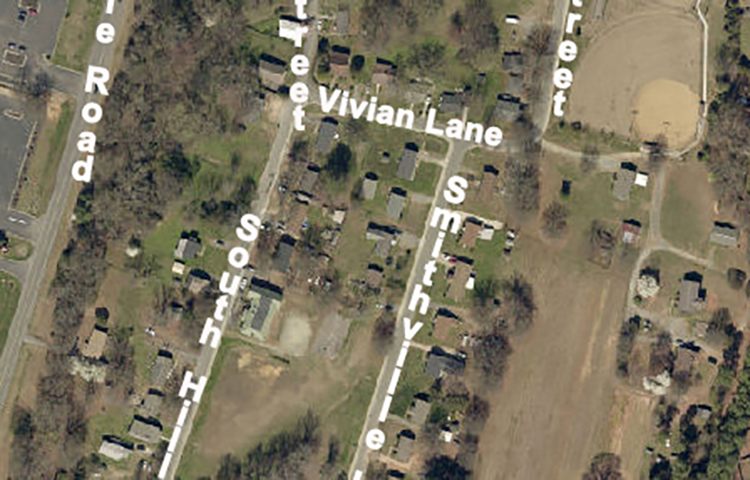
Smithville area map
Feb. 24. By Debbie Griffin. Issues discussed for years are coming to a head after a public meeting about potential options for preserving the character and heritage of Smithville, the historically African-American neighborhood just east of I-77.
Smithville consists of several streets north and south of Catawba Avenue, but the current focus is south of Catawba including South Hill Street, South Ferry Street, Vivian Lane, Weathers Street and Smithville Lane.
Opinions differ
Gentrification is good for some and bad for others, especially families with deep roots in an area where property values are soaring.
People in the meeting and every story source mentioned gentrification multiple times.Webster’s defines it this way: “the process of repairing and rebuilding homes and businesses in a deteriorating area, such as an urban neighborhood, accompanied by an influx of middle-class or affluent people that often results in the displacement of earlier, usually poorer residents.”

Mayhew-Jones
Lisa Mayhew-Jones, a leader in the Smithville Community Coalition, said revitalization efforts began in 2011, “We knew we’d have to find a way to revitalize our community or we’re looking at gentrification. It can wipe us out, it’s just that simple.”
Mayhew-Jones was a presenter at the late-January public meeting, along with fellow coalition member Willie Jones and two planners from a Charlotte-based architectural firm called Neighboring Concepts. Contacted for story input was Mayhew-Jones; Town of Cornelius Commissioner Denis Bilodeau, who is a former member of the coalition; Commissioner Thurman Ross, who is a resident; and Town of Cornelius Assistant Manager and Planning Director Wayne Herron.
Bilodeau said gentrification is a fact of life that has “gone wild” in Charlotte. He said coalition

Bilodeau
progress has taken longer than expected while development pressure grows fast. A hot, metro real-estate market is undeniably elbowing into Cornelius.
One of the top concerns is how gentrification can displace people on a fixed income. An example would be when someone buys property and builds a home far higher in value than those around it. New development or major improvements typically trigger taxation actions, such as revaluation, that drive up surrounding property values and price people out of the neighborhood.
Herron said another concern with gentrification is when developers prey on people who don’t realize their property value. Owners may end up accepting an offer that seems dazzling but is actually too low.
Mayhew-Jones said the coalition counters that problem with appraisals throughout Smithville. They should be finished around the end of February and provide good benchmarks.
What’s the plan?
Mayhew-Jones said the chief thing for people to know is there will be no displacement. The coalition is against that and wants people to comfortably stay in their neighborhood.
Any involvement with the SOS plan or support of it is completely voluntary.
Nothing about the plan is finalized and everything is conceptual, meeting presenters said. The coalition seeks support via volunteers for a committee, financial donations or discussions with property owners about the possibilities. For some hypothetical examples: Someone with vacant land could sell or donate it to the coalition, or an owner with a big piece of property could agree to subdivide and sell a portion.
The meeting handout says the coalition needs to raise about $3 million to reach three main objectives.
First, raise $250,000 for a fund that would help seniors repair or improve their homes. In theory, the coalition could arrange a no-payment, second-mortgage loan, and the seniors would agree to let the coalition be the first bidder if and when they sell. The mortgage would then be paid with property-sale proceeds.
Second, the Smithville Community Coalition wants be able to help anyone south of Catawba who wants to sell their home or land at a fair price for redevelopment. Mayhew-Jones said there are probably many families who have said for years “we need to do something with that property.”
Third, the development includes a plan for housing on vacant land, which the meeting handout says could accommodate up to 155 living units comprised of about 80 rentals and 75 owned homes. Projected, affordable, rent amounts would be between $450-$900 per month and could be locked in as affordable under the right purchase conditions. Home prices would range between $175,000 and $250,000.
There could be commercial developments facing Catawba Avenue and Statesville Road, which would provide the neighborhood with improved infrastructure. Another goal of the coalition is to raise funding and revitalize the old Rosenwald School for a community center.
Bilodeau said the same concerns exist in other east-side Cornelius neighborhoods and the plan is an attempt to “bring order where there’s chaos.”
Critics on both sides
People attending the meeting at the Union Bethel AME Zion Church said ideas were unclear, the conceptual drawings were bad and the plan is just a way to “take” their property one way or the other.

Ross
Ross has been a Cornelius commissioner since 1995 and lives in Smithville. He said it is human nature to resist change, but many neighbors tell him the process does not seem transparent. Ross said a lack of information causes distrust and residents feel like they’re not being heard.
Mayhew-Jones said later the recent presentation was the third one the planners had done in a year but the first in 2019. She said the coalition has always been open in its actions, but it cannot force people to be informed.
Ross said it’s difficult to see the big picture and how the overall plan will affect residents in the end. People are wary that they’ve only heard about the first phase of the plan and what happens south of Catawba. Ross said Smithville could end up gentrified under the SOS plan just as much as an open and capitalistic market.
Smithville residents get ruffled because while they may have a connection to the neighborhood, some coalition members and leaders don’t live in it. Ross said he’s big on property rights and thinks residents should be the main stakeholders in the coalition, with a say in their future.
“I don’t think they need to be pressured into making a decision,” said Ross.
He said it is way outside some people’s comfort zone to think about selling off a piece of property and having strangers move in next door. Ross said a number of people don’t understand what the coalition is trying to “save” because Smithville isn’t going anywhere.
Ross said people want to know what is affordable since that’s different for everyone. They’d like to know who is on the coalition board and when it meets. He said the appraisals make people suspicious.
He said the presentation was a lot of complex information to comprehend, especially for people who hadn’t heard much about it yet. Neither proponents nor critics of SOS expect there to be 100 percent agreement on any development plan.
Ross added, “We need some things cleared up and have to learn to have a difference of opinion.”
People said they used to get fliers in their doors with meeting minutes and coalition updates. The presenters said the all-volunteer Smithville Community Coalition lost the person who had taken and distributed the notes. It needs people for committee work that ranges from communication and special events to housing and data management.
People criticized the expense of hiring planners, but meeting presenters said the coalition used grant money to get help it badly needed. The coalition’s current, grant-funded balance is about $29,000.
Mayhew-Jones said coalition member Willie Jones has been a “godsend” because he’s familiar with the issues from his retired profession. According to a retirement article about him in “Affordable Housing Finance” Magazine, Jones retired in 2015 as a senior vice president after 33 years with The Community Builders, a non-profit real-estate developer with East Coast and Midwest offices. Jones’ education includes a degree in sociology with a concentration in urban planning, and he’s studying to earn a master’s degree in theology at Hood Theological Seminary in Salisbury. Mayhew-Jones said he’s been a champion of human rights in the Smithville group and elsewhere. However, Ross and some constituents aren’t convinced Jones’ experience applies to Smithville, such as tax credits and other tools that may or may not be available locally. Herron said Cornelius repealed a land-use plan in the past because Smithville felt uninformed and pushed back on high-density concepts. In another DOT project, the neighborhood fought an intersection design that would have cut through Smithville.
Herron said construction is pending soon on the new Nannie Potts Lane. It will run south of Smithville Lane from Smith Circle to 19400 Statesville Rd., where there are a few, small, existing businesses including a coin laundry. The new street will not connect to the Smithville neighborhood, Herron said, because the majority of residents firmly refused a connection to it. He said the Smithville majority firmly refused a connection to Nannie Potts Lane, but it would be easy to add one in the future from either Smithville Lane or South Hill Street.
Herron commented, “Maybe for this to be successful, the neighborhood needs to figure out the plan and bring it to the town.”
Rich history, various efforts
Many Smithville homes have been in the same family for several generations. Mayhew-Jones grew up in Smithville and said her ancestors picked cotton on the land that is now Smithville Park. Other families have similar stories, and the coalition wants to preserve some of that heritage.
She said the former Rosenwald School on South Hill Street is privately owned now but was a real school some of her relatives attended. During her childhood, it was a community center.
“Everything was done there,” she said, including dances, meetings and other events.
Bilodeau said there has been a lot of discussion about how Rosenwald should be “so much more,” such as a senior or community center.
“Since we know change is coming,” Mayhew-Jones said, “why not do something? Smithville will not survive the way it is.”
Herron said if anything will succeed, it’s “neighbors working with neighbors.”
The Smithville Community Coalition has an active Facebook page and meets 6:30 p.m. the last Monday of each month, usually at the Union Bethel AME Zion Church on W. Catawba Avenue.



